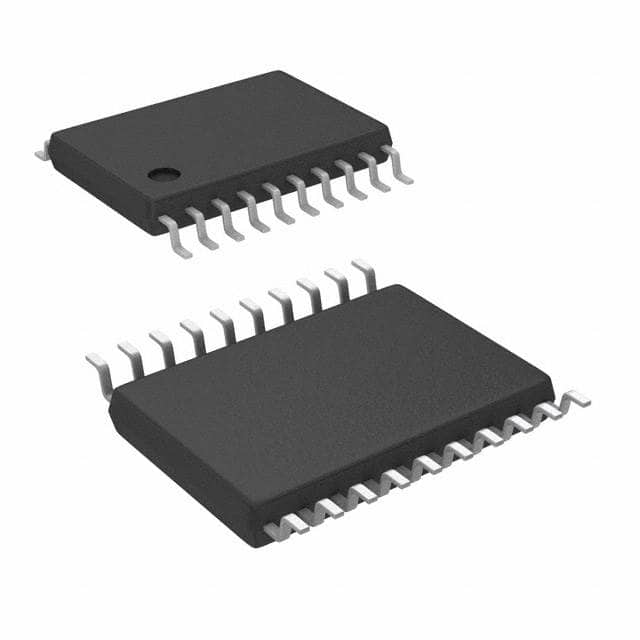Xem thông số kỹ thuật để biết chi tiết sản phẩm.

MM74HC240MTC
Product Overview
- Category: Integrated Circuit (IC)
- Use: Logic Gate Buffer/Driver
- Characteristics: High-Speed, CMOS Technology
- Package: 20-TSSOP (Thin Shrink Small Outline Package)
- Essence: The MM74HC240MTC is a high-speed CMOS logic gate buffer/driver that provides non-inverting outputs from buffered inputs. It is designed to be used in various digital applications where signal amplification and buffering are required.
- Packaging/Quantity: The MM74HC240MTC is typically sold in reels or tubes containing multiple units.
Specifications
- Supply Voltage: 2V to 6V
- Logic Family: HC
- Number of Channels: 8
- Input Type: Non-Inverting
- Output Type: Non-Inverting
- Propagation Delay: 11 ns (typical)
- Operating Temperature Range: -40°C to +85°C
Pin Configuration
The MM74HC240MTC has a 20-pin TSSOP package with the following pin configuration:
+---+--+---+
A1 -|1 +--+ 20|- VCC
A2 -|2 |- B1
A3 -|3 |- B2
A4 -|4 |- B3
A5 -|5 |- B4
A6 -|6 |- B5
A7 -|7 |- B6
A8 -|8 |- B7
GND -|9 |- B8
OE1 -|10 |- Y1
OE2 -|11 |- Y2
I1 -|12 |- Y3
I2 -|13 |- Y4
I3 -|14 |- Y5
I4 -|15 |- Y6
I5 -|16 |- Y7
I6 -|17 |- Y8
GND -|18 |- OE3
VCC -|19 |- OE4
+----------+
Functional Features
- Provides non-inverting outputs from buffered inputs.
- High-speed operation suitable for various digital applications.
- CMOS technology ensures low power consumption and compatibility with other logic families.
- Wide operating voltage range allows flexibility in different power supply configurations.
- 3-state outputs allow multiple devices to be connected together without bus contention issues.
Advantages and Disadvantages
Advantages: - High-speed operation enables efficient signal buffering and amplification. - CMOS technology provides low power consumption and compatibility with other logic families. - Wide operating voltage range allows flexibility in different power supply configurations. - 3-state outputs facilitate bus sharing and reduce bus contention issues.
Disadvantages: - Limited number of channels (8) may not be sufficient for certain applications requiring more inputs/outputs. - The TSSOP package may require careful handling during assembly due to its small size.
Working Principles
The MM74HC240MTC operates based on CMOS technology, which utilizes both NMOS and PMOS transistors to achieve high-speed performance and low power consumption. It functions as a buffer/driver by taking the input signals and providing non-inverted outputs with increased current drive capability. The device is controlled by the OE1 and OE2 pins, which enable or disable the outputs. When disabled, the outputs are in a high-impedance state, allowing multiple devices to be connected together without causing bus contention.
Detailed Application Field Plans
The MM74HC240MTC can be used in various digital applications, including but not limited to: - Microcontroller interfacing - Data communication systems - Memory address decoding - Signal amplification and buffering - Bus driving and buffering
Detailed and Complete Alternative Models
Some alternative models that offer similar functionality to the MM74HC240MTC include: - SN74HC240N by Texas Instruments - CD74HC240E by Texas Instruments - 74HC240D by NXP Semiconductors - MC74HC240AN by ON Semiconductor
These alternatives provide comparable features and performance, allowing users to choose the most suitable option based on availability, pricing, and specific application requirements.
Word count: 515 words
Liệt kê 10 câu hỏi và câu trả lời thường gặp liên quan đến ứng dụng MM74HC240MTC trong giải pháp kỹ thuật
Sure! Here are 10 common questions and answers related to the application of MM74HC240MTC in technical solutions:
Q: What is MM74HC240MTC? A: MM74HC240MTC is a high-speed octal buffer/line driver with 3-state outputs, commonly used in digital logic circuits.
Q: What is the maximum operating voltage for MM74HC240MTC? A: The maximum operating voltage for MM74HC240MTC is typically 6V.
Q: How many inputs and outputs does MM74HC240MTC have? A: MM74HC240MTC has 8 inputs and 8 outputs.
Q: Can MM74HC240MTC be used as a level shifter? A: Yes, MM74HC240MTC can be used as a level shifter to convert signals between different voltage levels.
Q: What is the maximum output current that MM74HC240MTC can drive? A: MM74HC240MTC can typically drive up to 35mA of output current.
Q: Is MM74HC240MTC compatible with TTL logic levels? A: Yes, MM74HC240MTC is compatible with TTL logic levels, making it suitable for interfacing with TTL devices.
Q: Can MM74HC240MTC be used in bidirectional communication? A: No, MM74HC240MTC is a unidirectional buffer and cannot be used for bidirectional communication.
Q: What is the propagation delay of MM74HC240MTC? A: The propagation delay of MM74HC240MTC is typically around 9 ns.
Q: Can MM74HC240MTC be used in high-speed applications? A: Yes, MM74HC240MTC is designed for high-speed operation and can be used in applications with fast switching requirements.
Q: What is the package type of MM74HC240MTC? A: MM74HC240MTC is available in a 20-pin TSSOP (Thin Shrink Small Outline Package) package.
Please note that the answers provided here are general and may vary depending on specific datasheet specifications and application requirements.

